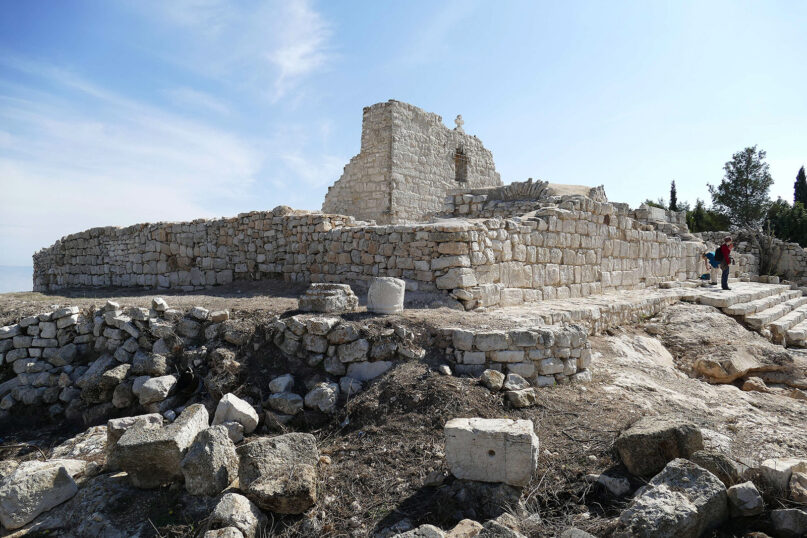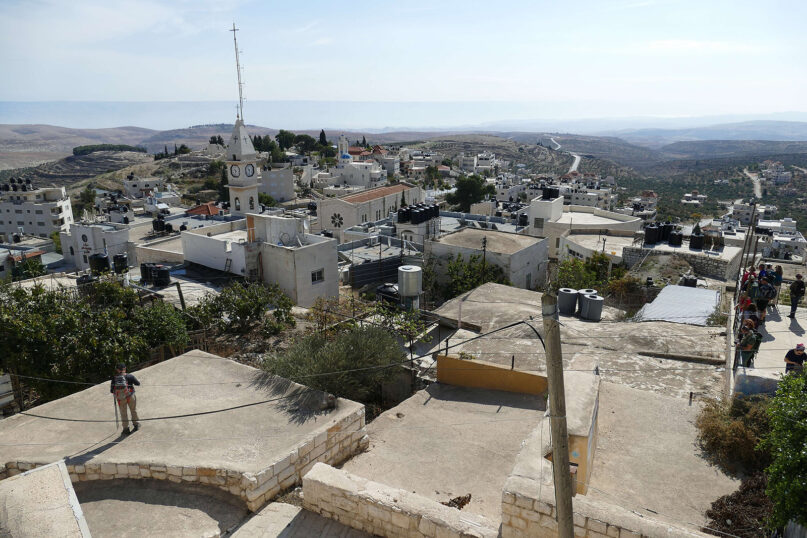JERUSALEM (RNS) — For years, extremist Israeli settlers have tried to intimidate the small clusters of Bedouin — Muslim tribal desert dwellers — living on the outskirts of Taybeh, the only fully Christian town in the West Bank. In the past two years, as the Bedouin have fled the area out of fear, these lawless young settlers have begun to threaten the residents of Taybeh, located 7 miles east of Ramallah.
Now, an arson attack that threatened Taybeh’s cemetery, homes and an ancient church has drawn international interest to the community’s plight.
On July 7, a group of settlers set fires near Taybeh’s cemetery and the Church of St. George, which dates back to the fifth century A.D. and is “one of the oldest religious landmarks in Palestine,” according to a statement issued the next day by three priests, the Revs. Daoud Khoury, Jack-Nobel Abed and Bashar Fawadleh, who represent the town’s Greek Orthodox, Latin Catholic and Greek Melkite churches, respectively.
The incident “was not isolated but part of daily attacks,” noted the priests. The “ongoing and grave” attacks “threaten the security and stability of our town.”
Settler attacks on Taybeh and dozens of other West Bank Arab communities have escalated since Israeli Prime Minister Benjamin Netanyahu’s far-right-wing government took power in January 2023, and especially since Oct. 7, 2023, when Hamas infiltrated Israel and murdered about 1,200 people and kidnapped 251 others.
“There is no way to overestimate the effect of the barbaric Hamas massacre on Israeli society,” said Arik Ascherman, a Reform rabbi and director of the Israeli human rights organization Torat Tzedek (Torah of Justice). “After Oct. 7, the settlers have been able to exploit the pain, anger and fear of Israelis across the political spectrum.”

The ruins of the fifth-century St. George Greek Orthodox Church in Taybeh in the West Bank in 2018. (Photo by Bukvoed/Wikimedia/Creative Commons)
The Netanyahu government’s inaction in reining in these settler gangs — many of them teenagers shunned by their own communities but encouraged by far-right members of the Israeli government — “tells settlers they are untouchable,” Ascherman said.
Settlers often graze their cattle on Taybeh’s land, including family-owned fields and near private homes, “without deterrence or intervention” from Israeli authorities, the town’s religious leaders said in their statement. This causes “direct harm” to the town’s olive trees, which provide a livelihood to many residents, and prevents farmers from accessing and cultivating their land.
Due to the illegal use of Taybeh’s land, “the town is being threatened by the expansion of illegal settlement outposts that are expanding quietly under military protection and serve as a launchpad for new attacks on residents and their lands,” the priests said. They called on diplomats, church representatives and others to investigate the ongoing attacks; apply diplomatic pressure “on the occupying authorities”; and to visit Taybeh to bear witness and support its residents.
“The settlers pretend this is their land and not our land,” Abed, the Latin Catholic priest, told Religion News Service in an interview. Although the town has always had unpleasant encounters with some of the settlers in the area, “it was not at this level,” Abed said. “We’ve called the police several times, but nothing was done.”
Unless the situation improves, he said, more Taybeh residents may feel compelled to emigrate, following many Christians in recent years. The combined effects of war, Muslim and Jewish extremism, and better economic opportunities elsewhere have depleted the West Bank’s Christian population over the past century.

Overlooking Taybeh in the West Bank in 2018. Photo by Bukvoed/Wikimedia/Creative Commons)
“Today only 1,300 people live in Taybeh. That’s about 10% of the people who once lived in Taybeh, who are scattered all over the world. We now have empty houses,” Abed said.
Khoury told RNS that Taybeh’s remaining residents feel helpless. “We have met with government officials and asked them to protect us. No one is listening. The Israeli soldiers protect the settlers. We can’t live in this situation,” he said.
On Monday (July 14), a delegation of Holy Land patriarchs and heads of churches traveled to Taybeh to express solidarity with the community.
“The church has had a faithful presence in this region for nearly 2,000 years,” the Council of Patriarchs and Heads of Churches of Jerusalem said in a statement after the visit, which included viewing video clips of settlers attacking Taybeh. The council called on Israeli authorities, whom they accused of “facilitating and enabling” the settlers’ presence around Taybeh, to hold the “radicals” accountable.
Ascherman, whose organization has documented numerous violent acts carried out by settlers against Bedouin shepherds and other Palestinians in the West Bank over the years, said he believes that U.S. President Donald Trump’s decision to cancel the sanctions that his predecessor, former President Joe Biden, had placed on a handful of violent settlers “sent an awful message.”
“I don’t know how effective the sanctions were, but canceling them told settlers ‘You are free to do what you want to do.’ Settlers almost never get arrested, indicted or convicted,” he said.
The goal of these young extremists, who are believed to comprise 2% to 5% of the nearly 500,000 Jewish residents of the West Bank, “is that there won’t be Palestinians in the West Bank,” Ascherman said. “They can’t really think they will make an entire village like Taybeh leave, but they can take more and more of their agricultural land and cause some people to leave.”
In the past month some of these same extremists have felt emboldened enough to physically attack Israeli soldiers — a red line for Netanyahu. In a statement, the prime minister said Israel “is a country of laws, and no one can take the law into their own hands.” He called for an investigation that will “bring to justice anyone who violated the law and acted against our soldiers.”
Netanyahu called the extremists “a small minority who do not represent the absolute majority of settlers, who are law-abiding and serve in the IDF and security forces.”
U.S. Ambassador to Israel Mike Huckabee has broken with the Trump administration’s relative silence on settler violence to call for action on the recent killing of Palestinian American Sayfollah “Saif” Musallet, who was allegedly beaten to death by settlers in the village of Sinjil near Ramallah last week. On Wednesday, Huckabee asked the Israeli government to “aggressively investigate the murder.”
“There must be accountability for this criminal and terrorist act. Saif was just 20 yrs old,” Huckabee wrote in a post on X.
Settler leaders have also been more vocal since July 6, when young settlers attacked IDF soldiers.
Rabbi Yaakov Medan, a respected leader in the Religious-Zionist movement, praised settler leaders for condemning the attacks but said they must also act to prevent what he called “hilltop youth” — a reference to the angry young men who carry out much of the violence — from attacking Palestinians.
While Palestinians often initiate violence against settlers, Medan told the Israeli news website Arutz 7, “what we are witnessing now is not retaliation for provocation, but rather aggression against Arabs in the name of the mitzvah of conquering the Land (which, according to some of the hilltop youths, even overrides Shabbat).
“Many of the youths (not all of them, Heaven forbid!) believe the IDF failed during Simchat Torah nearly two years ago,” Medan said, referring to the Hamas massacre that occurred on that Jewish holiday. Because of this, “they do not trust the army and try by force to push the Arabs away, in order to prevent another ‘Simchat Torah’ scenario in the future.
“This is a reality that we, in the settlement movement, must never accept,” Medan said.
“If we respond with nothing more than a shrug or a half-sigh at the actions of these youths, we will suffer blowback — which is already visible — from groups of people who don’t live here and will never accept such wild and unjustified behavior toward Arabs.”
Khoury said attempts to drive out the people of Taybeh won’t work.
“We are peaceful people who just want to live in peace and security. We were born here, raised here and we will stay here forever.”



